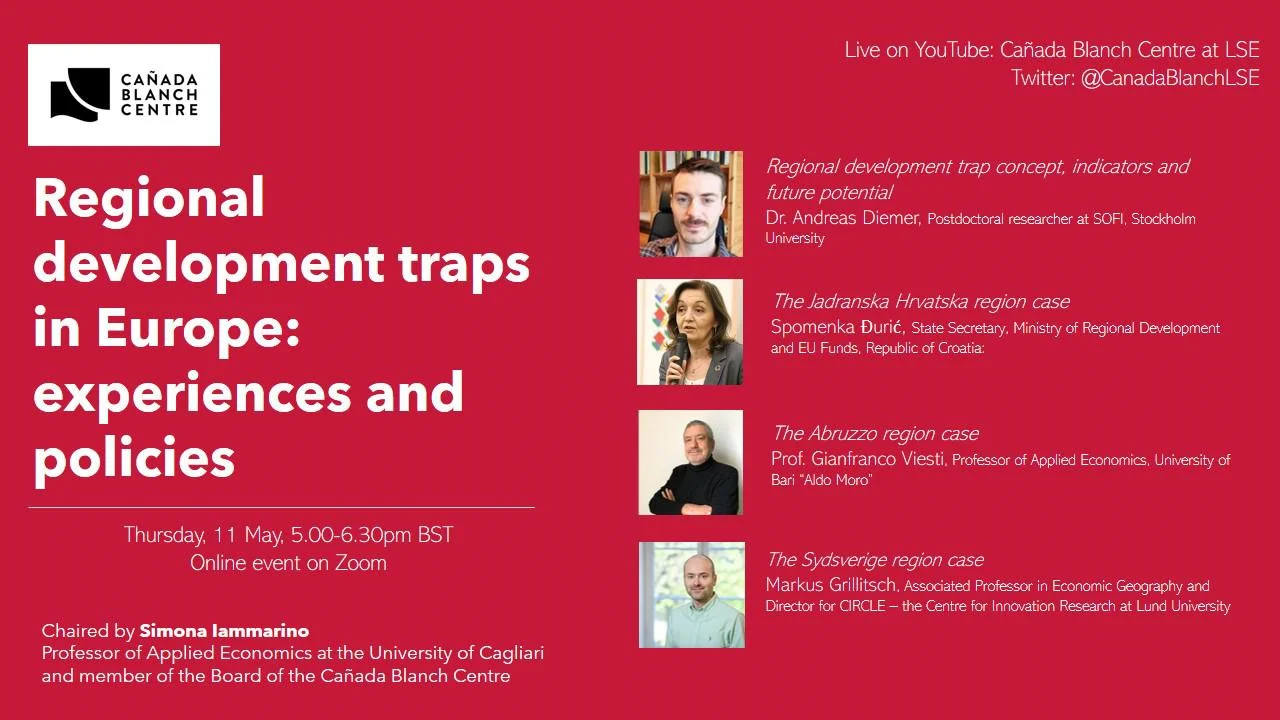Regional Development Traps in Europe: Experiences and Policies
The aim of the workshop is to discuss regional development traps in Europe through the perspectives of experts in relation to selected regional case studies.
The case studies (Jadranska Hrvatska, Croatia; Abruzzo, Italy; Sydsverige, Sweden) are included in the EC Report "Falling into the Middle-Income Trap? A Study on the Risks for EU Regions to be Caught in a Middle-income Trap".
The Report introduces and measures the concept of the regional development trap for the case of the European Union (EU). 1 The concept of regional development trap is deployed to identify EU regions that have lost their competitive edge and hence face significant structural challenges in retrieving past dynamism or just improving prosperity for their residents. The Report develops a definition of regional development trap derived from the theory of the middle-income trap. This concept has, until now, been applied at a national economy level in emerging countries. It proposes measures to identify those EU regions that can be considered to be in a development trap or at significant near-term risk of falling into such a trap.
The lecture will be introduced by Andres Rodriguez-Pose, Cañada Blanch Centre LSE, and chaired by Simona Iammarino, University of Cagliari, Italy, and Cañada Blanch Centre LSE.

Meet the speakers
Dr. Andreas Diemer, SOFI, Stockholm University: regional development trap concept, indicators and future potential (10-12 minutes)
Andreas Diemer is a postdoctoral researcher at the Swedish Institute for Social Research (SOFI) at Stockholm University. His research interests are in the area of regional science and urban economics. His work focuses on regional development dynamics, inequalities between places or demographic groups, and access to information or knowledge. You can know more about him here.
Ms Spomenka Đurić, State Secretary, Ministry of Regional Development and EU Funds, Republic of Croatia: the Jadranska Hrvatska region case (10-12 minutes)
Ms. Đurić is responsible for the overall design and implementation of the national regional policy including the setup of the system for its planning, management, and financing. She is directing the managing authority for the Program of integrated urban investments in Urban agglomerations and cities throughout Croatia; and the preparation of the Investment programme for areas with geographical and developmental specificities in Croatia.
Prof. Gianfranco Viesti, University of Bari, Italy: the Abruzzo region case (10-12 minutes)
Gianfranco Viesti is Full Professor of Applied Economics in the Department of Political Sciences of the University of Bari "Aldo Moro". He has been working extensively on topics of applied regional, industrial and international economics. He has been consultant fot the Italian national and regional governments, as well as for international organization.
Dr. Markus Grillitsch, CIRCLE, Lund University: the Sydsverige region case (10-12 minutes)
Markus Grillitsch, Associated Professor in Economic Geography and Director for CIRCLE – the Centre for Innovation Research at Lund University, holds a doctoral degree in socio-economic studies from the Vienna University of Economics and Business. His main research interest is to understand transformation processes in a spatial context and how they relate to economic, social, and environmental outcomes.
Q&As: 30 minutes
More about this event
The is the vehicle to achieve the objective of the Fundación Cañada Blanch: developing and reinforcing the links between the United Kingdom and Spain. This is done by means of fostering cutting-edge knowledge generation and joint research projects between researchers in the United Kingdom, and at LSE in particular, on the one hand, and Spain, on the other.
LSE holds a wide range of events, covering many of the most controversial issues of the day, and speakers at our events may express views that cause offence. The views expressed by speakers at LSE events do not reflect the position or views of The London School of Economics and Political Science.
From time to time there are changes to event details so we strongly recommend that if you plan to attend this event you check back on this listing on the day of the event.
Whilst we are hosting this listing, LSE Events does not take responsibility for the running and administration of this event. While we take responsible measures to ensure that accurate information is given here this event is ultimately the responsibility of the organisation presenting the event.
LSE holds a wide range of events, covering many of the most controversial issues of the day, and speakers at our events may express views that cause offence. The views expressed by speakers at LSE events do not reflect the position or views of the London School of Economics and Political Science.
